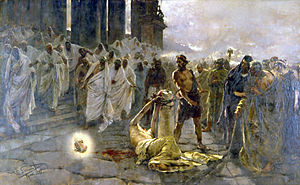Behead
| Decapitation | |
|---|---|
 |
|
| The Beheading of Saint Paul. Painting by Enrique Simonet in 1887, Malaga Cathedral | |
| Classification and external resources | |
| Specialty | emergency medicine |
| ICD-10 | S18 |
Decapitation (from Latin, caput, capitis, meaning head) is the complete separation of the head from the body. Such an injury is typically fatal to humans and many other animals, since it deprives all other organs of the involuntary functions that are needed for the body to function, while the brain is deprived of oxygenated blood.
The term beheading refers to the act of deliberately decapitating a person, either as a means of murder or execution; it may be accomplished, for example, with an axe, sword, knife, or by other more sophisticated means such as a guillotine. An executioner who carries out executions by beheading is called a headsman. Accidental decapitation can be the result of an explosion, car or industrial accident, improperly administered execution by hanging or other violent injury. Suicide by decapitation is rare but not unknown. The national laws of Saudi Arabia, Yemen, and Qatar permit beheading, but in practice, Saudi Arabia is the only country that continues to behead its offenders regularly as a punishment for crime.
Less commonly, decapitation can also refer to the removal of the head from a body that is already dead. This might be done to take the head as a trophy, for public display, to make the deceased more difficult to identify, for cryonics, or for other, more esoteric reasons.
Execution by beheading has been used as a form of capital punishment for millennia. The terms "capital offence", "capital crime", "capital punishment," derive from the Latin caput, "head", referring to the punishment for serious offences involving the forfeiture of the head; i.e., death by beheading. In some cultures, such as ancient Rome and Greece, decapitation was regarded as the most honorable form of death. The extension of the "privilege" of beheading to criminals of ordinary birth was among the symbolic changes brought about by the French Revolution. In other cases, such as the use of beheading by Japanese troops during World War II, its use was considered a form of contempt. In recent times, it has become associated with terrorism.
...
Wikipedia
